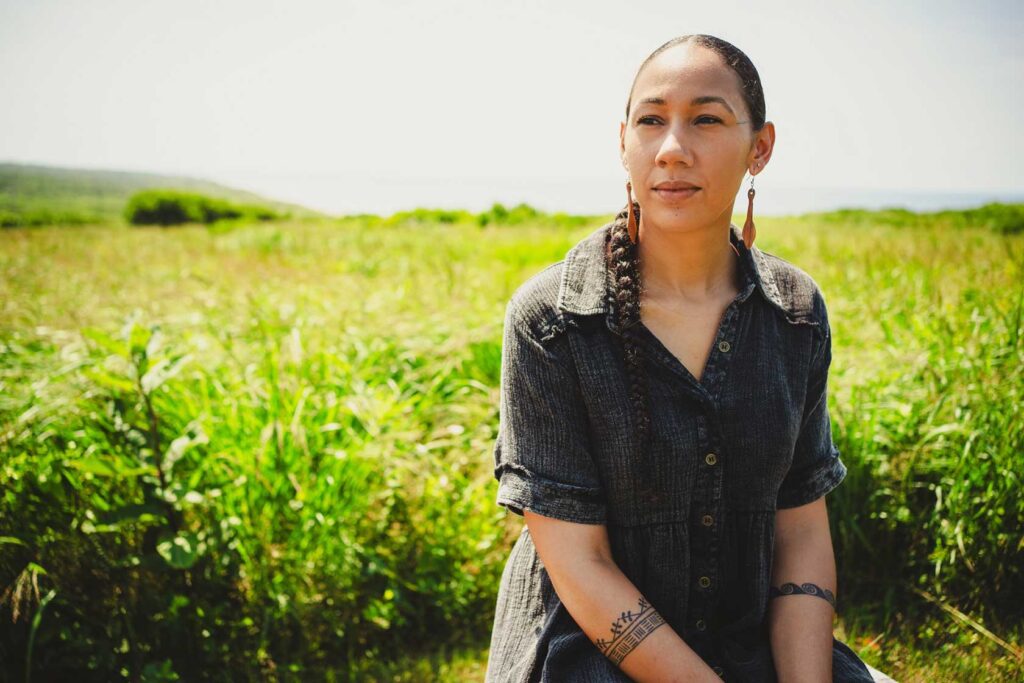
Every February, Martin Luther King Jr. and Maya Angelou are taught in classrooms, and come September, America celebrates Latinx and Hispanic culture and community. But November marks a month dedicated to celebrating an often overlooked and glossed-over community.
November is National Native American Heritage Month. The month signifies the recognition of the first Americans who settled in this country. History often leaves out the parts that are crucial to understanding the development and birth of our nation.
Native American Heritage Month provides an opportunity that should not be restricted to November; however, it allows us to interface with and celebrate the vibrant cultures, histories and contributions of Native people across the country and within the Commonwealth.

Aquinnah Cultural Center, Aquinnah, MA PHOTO: NADAIZJA BOLLING
NaDaizja Bolling and Amira Madison are both members of the Aquinnah Wampanoag tribe located on the southwest tip of Martha’s Vineyard. Both women have dedicated their lives to their tribe and culture.
“One of the biggest parts of this role is having to tell the story of Natives in New England,” said Madison.
“You’ll see our language represented in cities and towns across the state. Our streets and highways are based on trails created [by Indigenous peoples/communities] prior to 1630. Storytelling is how we build cultural competency, which then helps non-Native people understand our communities. Being able to talk about history just feeds my need to educate and learn.”
Madison, originally from Boston, grew up in foster care in her early youth and spent a lot of time with her grandparents. But her connection to the Aquinnah Wampanoag tribe came into her life in a prominent way when one of her grandmothers let Amira’s social worker know of her connection to the tribe.
Because of the Indian Child Welfare act, Native American children who are enrolled in a tribe simultaneously with being in foster care are entitled to access to their Native tribe and community. For Madison, that was the Aquinnah Wampanoag tribe on Martha’s Vineyard.
“I got into foster care, and eventually, I returned home to Martha’s Vineyard because I was a native. My grandmother had noted to my social worker at some point that I was Native American and belonged to a tribe and so she pushed for them to connect with my tribe. So, I returned to the Vineyard when I was 11 or 10, and I moved into a foster home that was more local to the Vineyard and where I was able to be in community with my tribe.”
A graduate of Northeastern, Madison, has been involved in various roles dedicated to supporting the Indigenous community in the Commonwealth. She has been a tribal youth coordinator and docent at the Aquinnah Cultural Center, and now, in her role as a program manager supporting Indigenous communities in the City of Boston’s Mayor’s Office, Madison continues to use her knowledge to work with others to spread cultural awareness.
NaDaizja Bolling, also a member of the Aquinnah Wampanoag tribe, like Madison, has dedicated her work to Aquinnah, the place she considers her home.
“I’ve always known that I’d end up home in Aquinnah, but this wasn’t a calculated decision. Things just lined up in a way that made so much sense that the transition felt easy and natural,” she said.
The Boston native began her early career in public health after graduating from Syracuse University. From Syracuse, she went on to earn her master’s degree at the University of Virginia in business analytics before pivoting to a career that spoke to her heritage and community. While her path back to her tribe wasn’t linear, her work since going home has been rooted in the development of longevity for the Aquinnah Cultural Center and the support of her tribe.
“My heritage and understanding of our community’s history and values naturally guided me toward this path. Serving my community allows me to be part of the ongoing effort to strengthen our collective identity and resilience, which has always felt like the work I was meant to do,” said Bolling.
“Wampanoag culture is the heart of everything we do at the Aquinnah Cultural Center. Whether we are curating exhibitions to share with the public at our museum or creating spaces for families to engage with more traditional Wampanoag ways, we are ensuring that our history and our traditions are visible and accessible for future generations of Wampanoag people,” she added. “It is both a privilege and a calling to draw upon my elders’ and ancestors’ wisdom, as well as contemporary knowledge, to deliver on the ACC’s mission as a community-centered organization.”
Bolling considers her heritage and history to be two-fold, with her Native American heritage on Martha’s Vineyard being just as important to her as her and her family’s connection to the city of Boston.
“My great grandfather, Royal Bolling, was the first Black state senator from Massachusetts, and then … Uncle Royal and Uncle Bruce also had roles in public service, and there’s a Boston municipal building named after Uncle Bruce. I know we’re focused on Native heritage, but you know I’m a mixed person, and I just don’t want to leave out parts of myself.”
Referring to the Bruce C. Bolling Municipal Building in Nubian Square, Bolling was clear that while her work lies with her tribe, she still acknowledges her history holistically and is passionate about both sides of her heritage.
“Telling our own history is vital because it ensures that our stories are shared with authenticity, not from the perspective of our oppressors,” exclaimed Bolling. “Aquinnah Wampanoag people are not observers of our history; we are a continuation of it. The traditions, values, and lessons we share come directly from our connection to the land, our ancestors, our community, and the lives we live today. By telling our stories ourselves, we honor those who came before us and ensure future generations have a true and meaningful understanding of who we are.”






